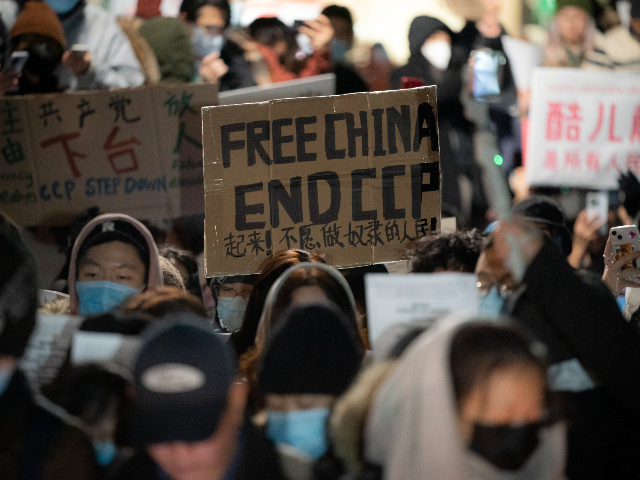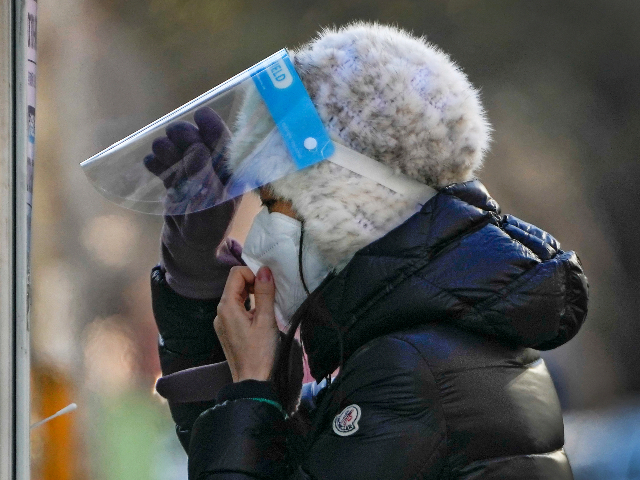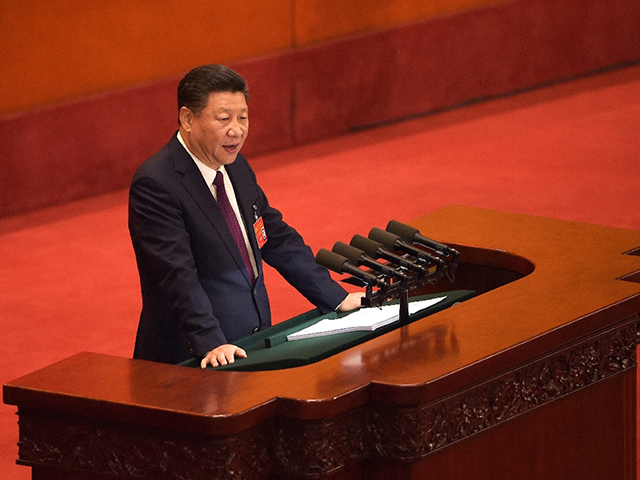Chinese dictator Xi Jinping urged his subjects to seek “unity” with each other even while holding “different views on the same issue” in his New Year’s Eve address this weekend, an apparent acknowledgment of growing anti-communist sentiment after a year of historic protests in his country.
Xi’s repressive communist policies, particularly lockdowns and mass imprisonment of individuals as part of the country’s “zero-Covid” policy, emboldened a growing protest movement nationwide. Chinese officials locked down some of the country’s biggest and most economically important cities in the country – including its wealthiest, Shanghai – in 2022, resulting in a national outcry attracting thousands of protesters to demand freedom in simultaneous protests during the last weekend of November.
The November protests occurred in Shanghai, Beijing, Guangzhou, and other major cities, and included Zhengzhou, where the world’s largest iPhone factory had been in an intermittent state of riot over coronavirus protocol for nearly a month at that point. Both Apple and Foxconn, the iPhone supplier that runs the Zhengzhou factory, have since reportedly made plans to expand manufacturing outside China.

Protesters gather near the Chinese consulate to stand in solidarity with their counterparts around the world demonstrating against China’s severe anti-virus restrictions, Tuesday, Nov. 29, 2022, in New York. Protests in China, which were the largest and most wide spread in the nation in decades, included calls for Communist Party leader Xi Jinping to step down. (AP Photo/John Minchillo)
Prior to the last weekend in November, however, human rights monitors had begun documenting a marked increase in protests throughout China.
“Between June and October of this year, Freedom House’s China Dissent Monitor tracked at least 822 public expressions of dissent, with incidents scattered among 27 provinces,” Michael Abramowitz, the president of the human rights NGO Freedom House, told Breitbart News in December. “Dozens of protests attended by thousands of people might seem small in a country with 1.5 billion, but considering how little on-the-ground reporting makes it through the Great Firewall, what we’ve seen this week is likely just the tip of the iceberg.”
The Chinese Communist Party barely acknowledged the protests directly, only publishing unspecified complaints about alleged foreign “infiltration” in some government propaganda outlets. The Party did appear to immediately respond to the protests by announcing an “optimization” of the lockdown policy that would result in, allegedly, no more “large-scale” lockdowns and allowing people who test positive for Chinese coronavirus but exhibit mild or no symptoms to avoid being imprisoned in a quarantine camp. Chinese officials insisted that the change in policies was not a form of “lying flat” – a derisive term the Chinese government uses for America and other Western countries that have largely ceased large-scale civil rights violations to allegedly stop the spread of the virus.
Xi addressed the extremely turbulent year for Chinese citizens in his New Year’s Eve address, thanking citizens for their sacrifices but admitting that the Communist Party will require “extra effort” on their part in 2023.
“Officials and the general public, particularly medical professionals and community workers, have bravely stuck to their posts through it all. With extraordinary efforts, we have prevailed over unprecedented difficulties and challenges, and it has not been an easy journey for anyone,” Xi admitted, according to the Chinese Foreign Ministry’s translation of his address.
“Everyone is holding on with great fortitude, and the light of hope is right in front of us,” Xi proclaimed. “Let’s make an extra effort to pull through, as perseverance and solidarity mean victory.”
Elsewhere in the speech, Xi recognized a variety of other disasters that plagued the Chinese people under his watch, including “earthquakes, floods, droughts and wildfires, and … some workplace accidents.”
“Amid those disconcerting and heartbreaking scenes, there have emerged numerous touching stories of people sticking together in face of adversity or even sacrificing their lives to help others in distress,” Xi noted. “Those heroic deeds will be forever etched in our memories. At every turn of the year, we always think of the great character of resilience that the Chinese nation has carried forward through millennia. It gives us still greater confidence as we continue our way forward.”

A woman wearing a face mask and face shield get ready for her routine COVID-19 throat swab at a coronavirus testing site in Beijing, Wednesday, Dec. 7, 2022. China has announced new measures rolling back COVID-19 restrictions, including limiting lockdowns and testing requirements. (AP Photo/Andy Wong)
Towards the end of his remarks, Xi urged “unity” and appeared to recognize a right in China to “hold different views” – a right that the Chinese Communist Party has never, in practice, respected. Xi did not mention the protests directly, but his call for “communication” appeared to be a response to them, as ideological diversity is rarely a topic in his public statements. He also explicitly mentioned concerns of the increasingly disillusioned Chinese young people, urging them to “keep their country in mind, cultivate keen enterprise, and live youth to the fullest with great drive, to prove worthy of the times and the splendor of youth.”
“Going forward, China will be a country that draws its strength from unity. Ours is a big country. It is only natural for different people to have different concerns or hold different views on the same issue,” Xi said. “What matters is that we build consensus through communication and consultation.”
“When the 1.4 billion Chinese work with one heart and one mind, and stand in unity with a strong will, no task will be impossible and no difficulty insurmountable,” Xi concluded.
He incorrectly included the sovereign nation of Taiwan as part of the “Chinese nation” – a longtime false territorial claim on the part of the Communist Party – as well.
“The people on both sides of the Taiwan Strait are members of one and the same family. I sincerely hope that our compatriots on both sides of the Strait will work together with a unity of purpose to jointly foster lasting prosperity of the Chinese nation,” he added.
On this topic, as well, Xi’s tone appeared to have softened in past years. In 2019, for example, Xi promised that anyone who recognized the sovereignty of Taiwan would have their “bones ground to powder.”
The Chinese state propaganda newspaper Global Times emphasized Xi’s call for “unity,” citing a state-approved “expert” who called unity the “core” of Xi’s message. The Global Times also claimed that Weibo, the state-controlled social network, was organically flooded with praise for Xi’s speech and the allegedly superior leadership of the Chinese Communist Party.
“Every Chinese is the hero in 2022 and our country has also been a hero. We are ready to usher in a new year in 2023 with our motherland and wish our country to enjoy long-term prosperity,” a pro-regime “netizen” allegedly shared on Weibo.

COMMENTS
Please let us know if you're having issues with commenting.